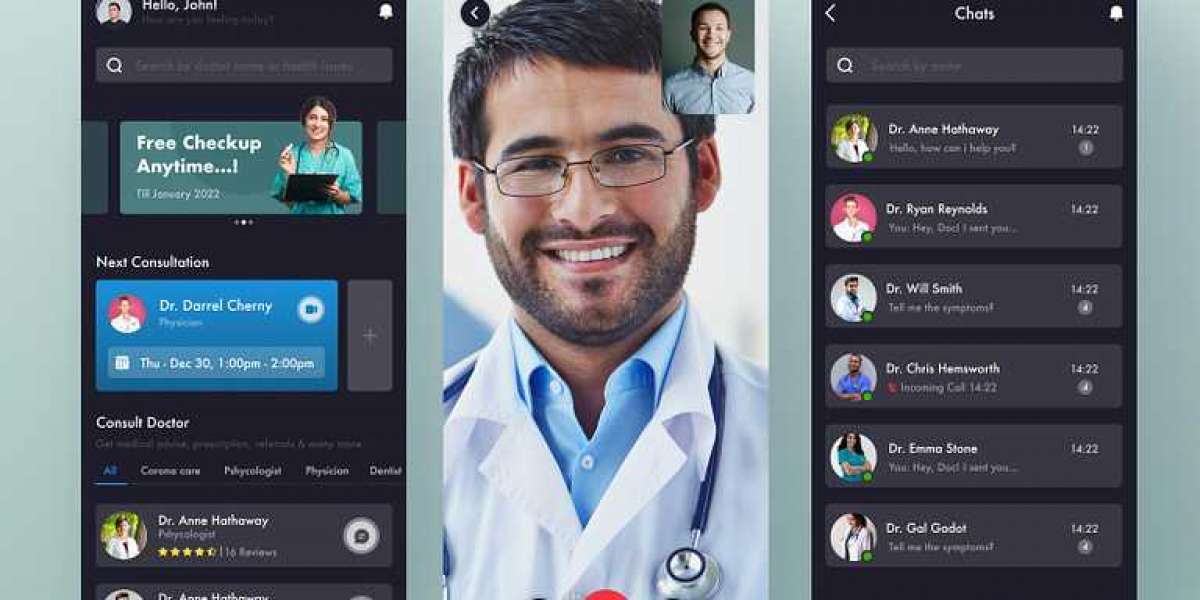In recent years, the healthcare industry has undergone a transformative shift, largely fueled by advancements in technology. One of the most significant developments is the integration of the Internet of Medical Things (IOMT) into healthcare mobile apps. This paradigm shift has not only enhanced patient care but has also opened up new possibilities for healthcare professionals and patients alike. In this blog, we will explore the pivotal role of IOMT in healthcare mobile apps, and how hiring app developers in India can contribute to the development of cutting-edge solutions.
Understanding the Internet of Medical Things (IOMT):
The Internet of Medical Things refers to the network of medical devices and applications that communicate and share data through the internet. In the context of healthcare mobile apps, IOMT involves the incorporation of smart devices, wearables, sensors, and other connected technologies to gather real-time health data. This data is then transmitted securely to the app, allowing for comprehensive health monitoring and analysis.
Key Components of IOMT in Healthcare Mobile Apps:
1. Wearable Devices and Sensors:
Wearable devices, such as fitness trackers, smartwatches, and health monitoring wearables, play a crucial role in IOMT. These devices are equipped with sensors that collect various health metrics, including heart rate, sleep patterns, activity levels, and more. Integrating these wearables with healthcare apps provides users and healthcare professionals with a holistic view of an individual's health.
2. Remote Patient Monitoring:
IOMT enables remote patient monitoring, allowing healthcare providers to keep track of patients' health status outside traditional clinical settings. This is especially beneficial for individuals with chronic conditions, as it facilitates proactive management and timely interventions. Healthcare mobile apps can display real-time data, alerting both patients and healthcare professionals to any deviations from the norm.
3. Data Interoperability:
Interoperability is a key aspect of IOMT in healthcare mobile apps. The ability to seamlessly exchange and interpret data between different devices and systems enhances the overall efficiency of healthcare delivery. App developers need to focus on creating platforms that can integrate data from various sources, ensuring a comprehensive and accurate health profile for users.
4. Machine Learning and Predictive Analytics:
The integration of machine learning and predictive analytics is a game-changer in healthcare apps leveraging IOMT. By analyzing the vast amounts of health data collected, these technologies can identify patterns, predict potential health issues, and provide personalized insights. This not only enhances preventive care but also contributes to more effective treatment strategies.
5. Telemedicine and Virtual Consultations:
IOMT facilitates telemedicine by enabling virtual consultations between healthcare providers and patients. Healthcare mobile apps can integrate video conferencing, secure messaging, and data sharing functionalities to support remote healthcare delivery. This is particularly beneficial for individuals in remote areas or those unable to visit healthcare facilities in person.
Also Check: Top 10 Healthcare App Development Companies
Role of IOMT in Improving Patient Outcomes:
1. Early Detection and Intervention:
The continuous monitoring enabled by IOMT allows for early detection of health issues. For example, wearables can detect irregularities in heart rate or blood pressure, triggering alerts for both patients and healthcare providers. Early intervention can significantly improve outcomes and reduce the severity of health conditions.
2. Personalized Treatment Plans:
With the wealth of data provided by IOMT, healthcare mobile apps can generate personalized treatment plans. These plans take into account individual health metrics, lifestyle factors, and historical data to tailor interventions and recommendations. This personalized approach enhances the effectiveness of healthcare strategies, leading to better patient adherence and outcomes.
3. Patient Empowerment:
IOMT empowers patients by providing them with access to their own health data. Patients can actively participate in their healthcare journey, make informed decisions, and collaborate with healthcare professionals. This shift towards patient-centric care fosters a sense of ownership and responsibility for one's health.
Also Read: Benefits of the Internet of Medical Things
Leveraging Indian App Developers for IOMT Healthcare Solutions:
India has emerged as a global hub for technology and software development, with a wealth of skilled app developers specializing in healthcare solutions. Hiring app developers in India offers several advantages, including cost-effectiveness, a vast talent pool, and a strong focus on quality. When selecting a healthcare app development company , it's essential to ensure that they have expertise in IOMT, data security, and compliance with healthcare regulations.
1. Expertise in Healthcare Standards:
Indian app developers well-versed in healthcare standards, such as HL7 (Health Level Seven) and DICOM (Digital Imaging and Communications in Medicine), ensure that your IOMT healthcare app complies with industry norms. This expertise is crucial for seamless integration with existing healthcare systems and interoperability with diverse medical devices.
2. Focus on Data Security:
Healthcare apps dealing with sensitive medical data must prioritize security. Indian app developers are experienced in implementing robust security measures, including encryption, secure data transmission, and compliance with international data protection standards. This is especially critical in the context of IOMT, where patient privacy and data security are paramount.
3. Agile Development Methodology:
The agile development methodology, widely embraced by Indian app developers, is particularly beneficial for IOMT projects. This approach allows for iterative development, continuous feedback, and the flexibility to adapt to evolving project requirements. It ensures that the final product meets the needs of both healthcare providers and end-users.
4. Cost-Effective Solutions:
Cost-effectiveness is a significant advantage to hiring app developers in India . While maintaining high-quality standards, Indian development teams offer competitive pricing, making IOMT healthcare solutions more accessible to a broader audience.
Conclusion:
The integration of IOMT in healthcare mobile apps represents a revolutionary step towards more proactive, personalized, and efficient healthcare delivery. As technology continues to advance, harnessing the expertise of app developers in India becomes instrumental in bringing innovative healthcare solutions to the global stage. By embracing IOMT, healthcare apps can not only enhance patient outcomes but also contribute to the evolution of a more connected and patient-centric healthcare ecosystem.
Related Blog: Top Benefits and Use Cases of AI in Healthcare








